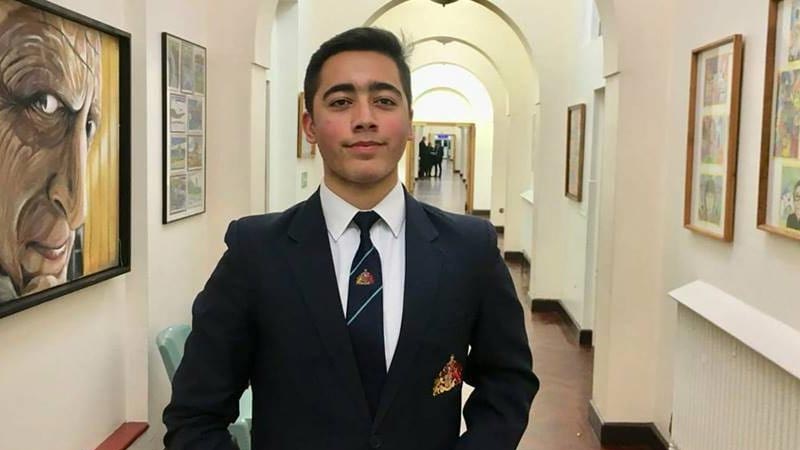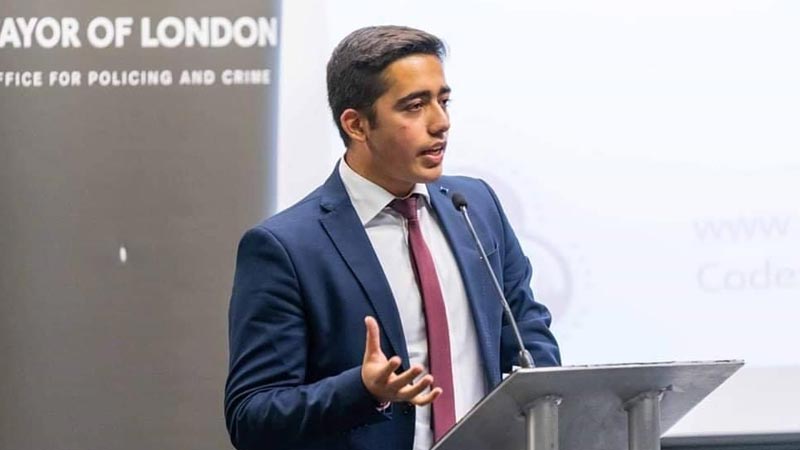 On the fifth anniversary of one of the most painful and the most brutal terror attack in the history of Pakistan, the Army Public School attack of December 16, 2014, I spoke to Ahmad Nawaz. Ahmad, 18, is an APS survivor, currently a resident of the United Kingdom, is studying for his entrance exam for the Oxford University, and doing so much else that his story would be best told in his own words.
On the fifth anniversary of one of the most painful and the most brutal terror attack in the history of Pakistan, the Army Public School attack of December 16, 2014, I spoke to Ahmad Nawaz. Ahmad, 18, is an APS survivor, currently a resident of the United Kingdom, is studying for his entrance exam for the Oxford University, and doing so much else that his story would be best told in his own words.
“On the day of 16 December 2014, on the day of the attack, I was only 14 years old. My brother, Haris Nawaz was 13 years old. On the day of the attack, I was in the auditorium at APS where most of the students were killed. My friends and I were in the auditorium for [a session of] first-aid training, which was quite unusual. Before that day we had never had first-aid training.
On that first day of training, during the third lesson [period], a group of men with guns and bombs in their hands entered our school. They started shooting children. I was shot after a while [when they started shooting children]. I saw my friends being killed right in front of my eyes. An hour, perhaps an hour and a half later, I saw my teacher being burnt alive right in front of my eyes. I had to see all those horrible things on that day in my school.
I was brought to a hospital. I was in the school for about three hours after I was shot. I had lost a lot of blood. I was in [such] a condition that the doctors thought they wouldn’t be able to save my arm. The moment I was brought to the hospital I was taken into surgery. I don’t remember anything after that.
I didn’t know about my brother’s death at that point. I found out about it in the hospital fifteen days after the attack. No one told me. When I finally knew about my brother’s death I was heartbroken. I don’t even remember how I felt at that point. Just that I was totally heartbroken. I couldn’t have imagined [anything like that] ever before. One cannot imagine one’s brother or a family member being killed in such a horrible incident.
When I realised that that attack had happened, I couldn’t believe it for a very longtime. For weeks, I couldn’t believe what had happened. It was an extended dream, an extended nightmare. I had a lot of nightmares in the days after the attack .I used to start shaking. My parents would sit with me to comfort me. It was a very horrible time. I don’t think I’ll ever be able to erase the memories of the attack.
After the APS attack, we were brought to the UK because of the incredible support of the people of Pakistan. The [then] government wasn’t willing to send us abroad but it was the people of Pakistan who pushed the government. They came out in the streets to force the government to send us abroad for treatment. The doctors said that if I stayed in Pakistan they would have to amputate my arm.
When we came here the Pakistani community, in general, gave us a great deal of love and welcomed us into this country. That made the transition from one country to another very easy. It [support of people] was very helpful.
I used to think a lot about why the attack happened. A lot of the times I would think about what I could do [in my personal capacity] to make sure that it doesn’t happen ever again.
The main thing that gave me strength after the attack was the death of my brother, and my friends who were killed in that attack. It was something that gave me strength to make sure that it doesn’t happen to anyone ever again. I started a campaign to make sure that I could [do my bit] to stop such attacks from happening. Initially, it started with an anti-radicalisation campaign. Later on, I moved onto providing educational opportunities for young people in different parts of the world.
I believe that the effect on my parents was very big. They not only lost a son but also had a son injured. That was very, very painful for them. I could see the pain in every family member’s eyes, and I think that was also one of the factors that led me to starting this campaign.
To be really honest, when I started this campaign the satisfaction and the pride that I got from it, and the love that I received from people are things that have given me strength to continue [my work]. Since [the initiation of] this campaign, a lot of people have shown [me] love and given me encouragement. I think that is something that has really stimulated me to do more, and more of the work that I’ve been doing.
After the APS attack, as I said, I thought a lot about why it happened, and what I could do to make sure that it doesn’t happen ever again. I think I made a pledge to myself from that day that one day I would start a campaign and lead a campaign so big that it would make an incredible impact in the sense that no child would ever have to go through the things that me, my brother and my friends at the Army Public School did. I believe the conditions and the situation in Pakistan have become much better, and I hope they stay that way. I hope things get even better.
One thing that I always feel sad about and something that upsets me is that the young people of Pakistan have a lot of potential, and that we have so many talented people in different fields of life, but the shame is that we don’t have opportunities. Politicians are busy mocking each other and making fun of each other and doing childish things, while they are overlooking the real potential in the country, the real future of the country. I think this is a failure of Pakistan’s political system that they [politicians]are more focused on criticising each other rather than looking at what it is that can make the future of our country better.
I think the future of our country is in the hands of the young people. But no one would give them the opportunity, and that really makes me sad. I wish and I hope that one day politicians would come to their senses and they would start supporting the young people in achieving their potential, in reaching the heights they deserve to reach. To come into leading roles on global platforms, on the national scale, young people have lost their confidence. They don’t have anyone to look up to, someone that can provide them with opportunities, provide them with the paths to go forward. I think we just need to get that hope back in the young people of Pakistan. They have lost the hope.
I know there has been a very long period of terrorism, a very long period of disparity. Young people have just been left alone as if they are useless, as if they are of no use to Pakistan, as if they are of no use to society. I think that is something that we need and that I am determined to do: to make sure that young people have that hope again. And they feel valued again. And they feel confident that they are the future of the country. They should come forward not just for the future of Pakistan but also for the future of this world. They should start coming forward. I’m hoping to do that along side my campaign for providing educational opportunities that will also focus on the impoverished parts of Pakistan.
I would love it if more young people started to come forward, do these kinds of activities and be involved. I will certainly help any young person who wants help from me. Because that is what I am doing it all for, that all my fellow young people in Pakistan feel that they have someone who can talk for them. That they have someone who can speak for them on a global platform. That they know that they are not alone.”

Ahmad is now running a campaign globally for youth empowerment. He was the first-ever young person to be invited by the president of Portugal to speak at the Global Estoril Conference in May 2019. Only heads of states and Nobel Peace laureates were invited to that conference. Ahmad met with leaders and Nobel Laureates to have their attention focused to youth’s role in society.
At 18, some of Ahmad’s achievements:
Recently launched a school, the Salam School
A school has been set up for 300 children in Chaheim Lebanon, approximately one hour from Beirut
Setting up schools (under process) in Malawi and Uganda
Some projects for Pakistan are under process
Ahmad’s Awards:
n Young Person of The Year (UK and Europe Award) 2015
n Points of Light Award by UK Prime Minister Theresa May 2019
n British Citizen Award 2019
n Pride of Birmingham Award by Pride of Britain 2019
n Asian Inspiration Award 2018
n Award of Bravery and resilience by UK Govt, in Birmingham City Council in 2016
n Officially Medal by Government of Pakistan in 2015
n Special Recognition award by Mayor Office of London 2018
n Awarded by Anne Frank Trust for his continuous work against radicalisation
n No2H8Crimes award, sponsored by Google
n The Diana Award, 2019, in House of Lords, London
n Legacy Award 2019 by the British Royal family